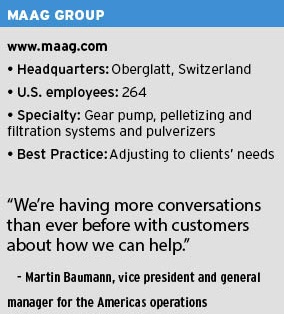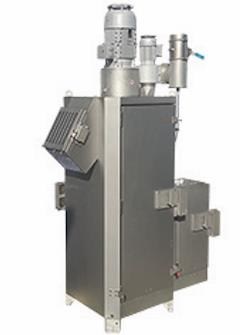
By: Alan Dorich, Author at Best Manufacturing Practices.
When clients turn to MAAG Group to meet their plastics processing needs, they can count on the Oberglatt, Switzerland-based company’s strong expertise. “People think plastic is plastic, but there are literally thousands of different plastics,” Martin Baumann says.
MAAG has a team of employees who have taken their knowledge and developed machines and systems that have lasted for up to 30 years for clients. “We configure to specific application needs, the required quality and how to put them in service and maintain them,” he says. “We have deep understanding of the functions of the systems.”
 Baumann is the vice president and general manager for the Americas operations of MAAG, which has roots that go back to 1890. Today, it manufactures gear pumps, pelletizing and filtration systems, and pulverizers. It serves customers in the polymer, chemical, petrochemical, pharmaceutical and food industries through multiple brands, including Gala Industries.
Baumann is the vice president and general manager for the Americas operations of MAAG, which has roots that go back to 1890. Today, it manufactures gear pumps, pelletizing and filtration systems, and pulverizers. It serves customers in the polymer, chemical, petrochemical, pharmaceutical and food industries through multiple brands, including Gala Industries.
MAAG serves multiple clients in the virgin polymer segment, it also provides products to the extrusion sector for making films and sheets. The company also provides products for compounding, as well as pelletizing systems and driers, Baumann says.
But MAAG’s work also puts it at the other end of the plastics value chain. “We build all the systems for recycling, melt filtration and specially built applications,” he says
Keeping Busy
Baumann says MAAG’s business continues to operate, even in the face of the coronavirus. “All of our customers are still up and running,” he says. “They’re all considered essential businesses.”
This separates MAAG’s business from others, such as the automotive industry, which recently shut down. “Our customers are basically begging us not to shut down,” Baumann asserts. “They need a supply of spare parts to keep going.”
Many plastics, he notes, are used in food and medical markets, including packaging and safety masks that are made from non-woven material. “All of that stuff is hugely important,” he says. “At this point in time, it’s not business as usual, but we’re still getting quite a bit of work and doing quotes.”
Baumann adds that the health and wellbeing of MAAG’s employees is of paramount importance, so to support their efforts, it has put in place extra measures to ensure the safety of the working staff, including enhanced sanitation practices, strict social distancing rules, visitation restrictions, along with other recommended procedures.
 But MAAG also has encountered challenges during the time of COVID-19. Recently, the company was forced to close a plant in Italy, but was able to transport its finished goods to other plants.
But MAAG also has encountered challenges during the time of COVID-19. Recently, the company was forced to close a plant in Italy, but was able to transport its finished goods to other plants.
The company also is experiencing delays on its shipments from Europe to the United States, which has made it harder to meet lead times and deliver on guarantees. This has made it essential, Baumann says, to check regularly with its suppliers.
MAAG is coping by working very closely with its clients. “We’re having more conversations than ever before with customers about how we can help,” he says, noting that this allows the firm to stay engaged with them during these difficult times. “We’re trying to come up with creative solutions in some cases.”
These solutions can be helpful, especially when its clients are restricting access to their facilities and traveling to their locations is more difficult. Instead of having associates fly, “We’ve had service techs drive 16 hours to reach customers,” he says.
MAAG also has worked to help clients remotely. It is using video chat systems such as FaceTime and Skype, “which actually works for the customer,” he says. “People have gotten pretty innovative very quickly.”
Accentuating the Positive
Baumann joined MAAG in 2019 after many years in the plastics industry. “I’ve always been associated with plastics and different kinds of machinery, from extrusion to injection molding in all kinds of market segments,” he says.
Today, Baumann oversees the company’s U.S. operations, which include plants in Eagle Rock, Va., and Kent, Ohio. MAAG also has a sales office in Charlotte, N.C., and a warehouse in Tyrone, Ga.
He adds that he is impressed with how quickly MAAG and its customers adjusted to the COVID-19 situation. Today, “Everybody is on the same page as far as social distancing, hand washing and sanitizing,” Baumann says. “It’s amazing how rapidly the industry was brought onto this new level of guidelines.”

Baumann sees a positive future ahead for MAAG, even with a downturn due to COVID-19. “But the good news for us is because we’re so broadly placed, we’re playing in multiple market segments,” he states. “That will help and buffer us from the upcoming crisis.
“Plastic is still a positive business to be in because we’re serving the entire value chain,” Baumann says. “We offer technologies that enable people to realize their projects. Plastics are not going to go away.”
This article originally appeared in Best Manufacturing Practices.